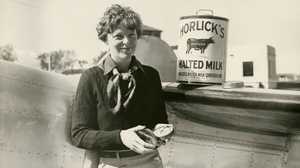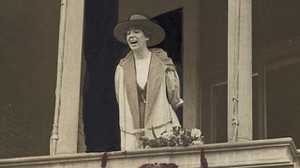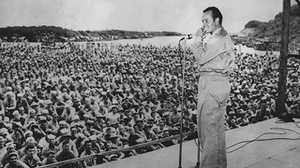22nd and 24th President

Terms: 1885-1889, 1893-1897
Political Party: Democrat
First Lady: Frances Folsom Cleveland
Vice President: Thomas A. Hendricks, Adlai E. Stevenson
Overview
Born: March 18, 1837, in Caldwell, New Jersey... "What is the use of being elected or re-elected unless you stand for something?" The first Democrat elected president since the Civil War, Grover Cleveland stood for probity, self-sufficiency and fiscal conservatism. He considered the presidency a check on abuses by Congress and vetoed 414 bills in his first term. The only president to serve two non-consecutive terms, Cleveland's second term coincided with a financial depression, the Panic of 1893... Died: June 24, 1908.
The Era
1886: Demonstrations in Chicago's Haymarket lead to the most sensational labor incident of the 19th century
1886: A gift from France, the Statue of Liberty, is dedicated in New York harbor
1888: Vincent van Gogh cuts off his ear
Domestic Policy
Cleveland's legacy developed less from any policy advocacy than from his principled rejection of special interest legislation. He vetoed veterans' claims that he believed fraudulent, as well as a bill to provide drought relief out west, because he believed a social welfare state was against American ideals. He did push for tariff reduction, but was blocked by Congress. In his second term, Cleveland authorized the use of federal troops to break up the Pullman workers' strike in Chicago -- his actions alienated the unions. Faced with a depression, Cleveland still refused to grant government aid. Instead he set about putting the federal government's financial house in order. He repealed the Sherman Silver Purchase Act and returned to a gold standard for U.S. currency. The subsequent run on government gold required that the government borrow from the New York financier J. P. Morgan.
Foreign Affairs
Cleveland shunned foreign entanglements and imperial ambitions. Revolutions in both Hawaii and Cuba seemed to require a response by the president but he chose not to acknowledge either, leaving those issues to his successors. Most significantly, when Venezuela requested American mediation of a border dispute with Great Britain, Cleveland sent warships to South America to compel the British to accept arbitration. This was seen as consistent with the Monroe doctrine.
Presidential Politics
Grover Cleveland ran for president three times, each time winning the popular plurality. His opponent in 1884, James Blaine, was tarred with financial impropriety and anti-Catholicism whereas Cleveland was forced to admit that he may have fathered a child out of wedlock. In 1888, the electoral college favored Banjamin Harrison — Cleveland lost his home state of New York by a slim margin, possibly a manufacturing state's response to his hatred of tariffs. Cleveland spent four years as a private citizen in New York City and then returned to beat Harrison in 1892.







